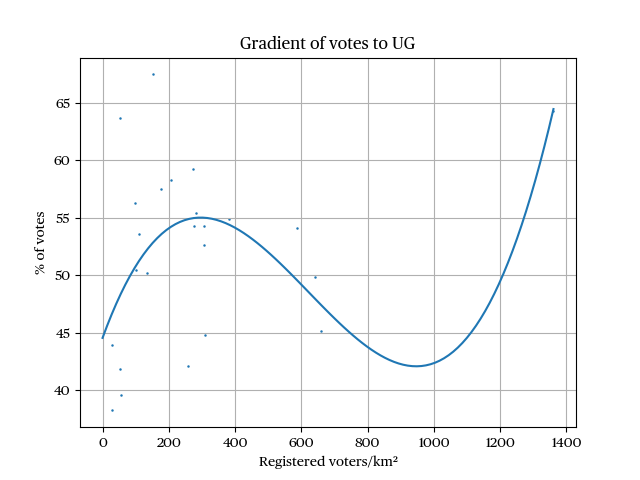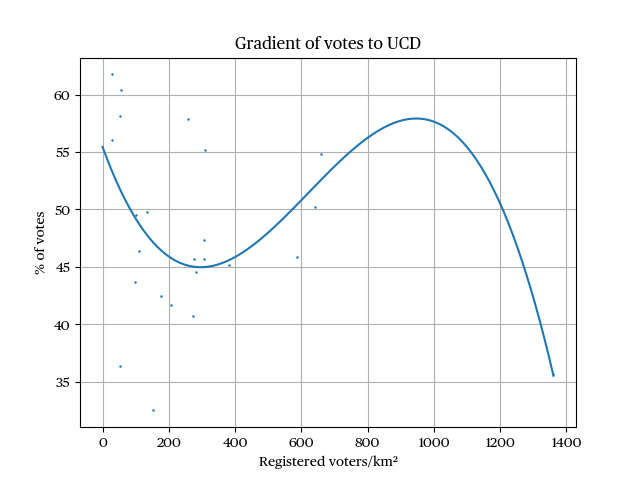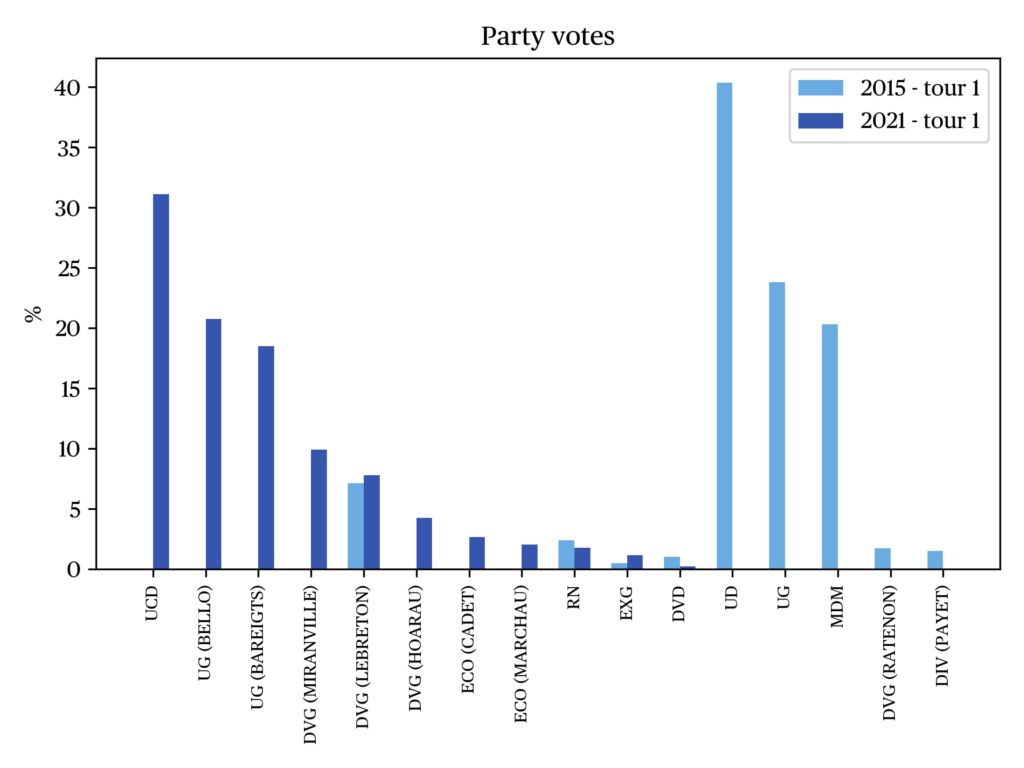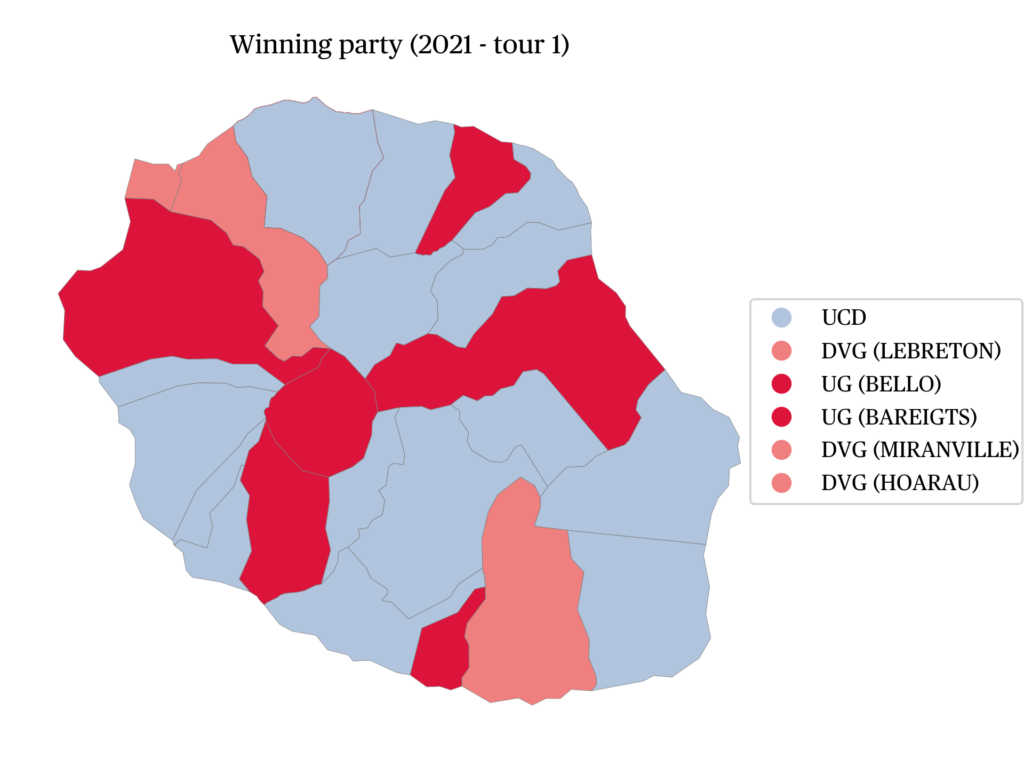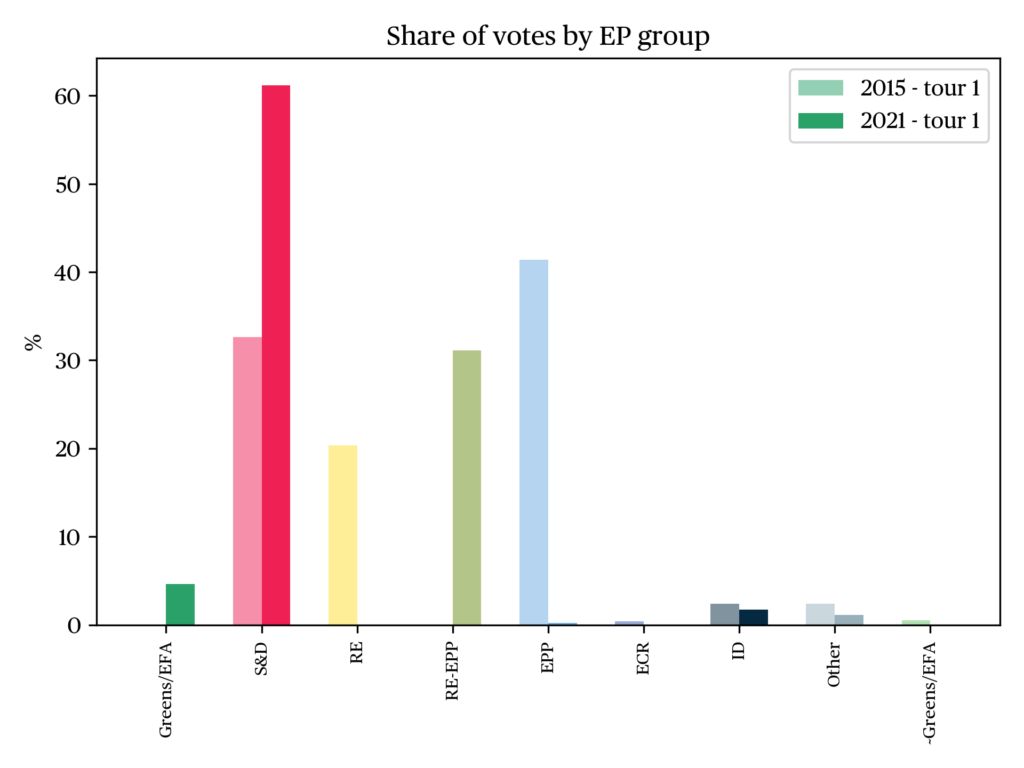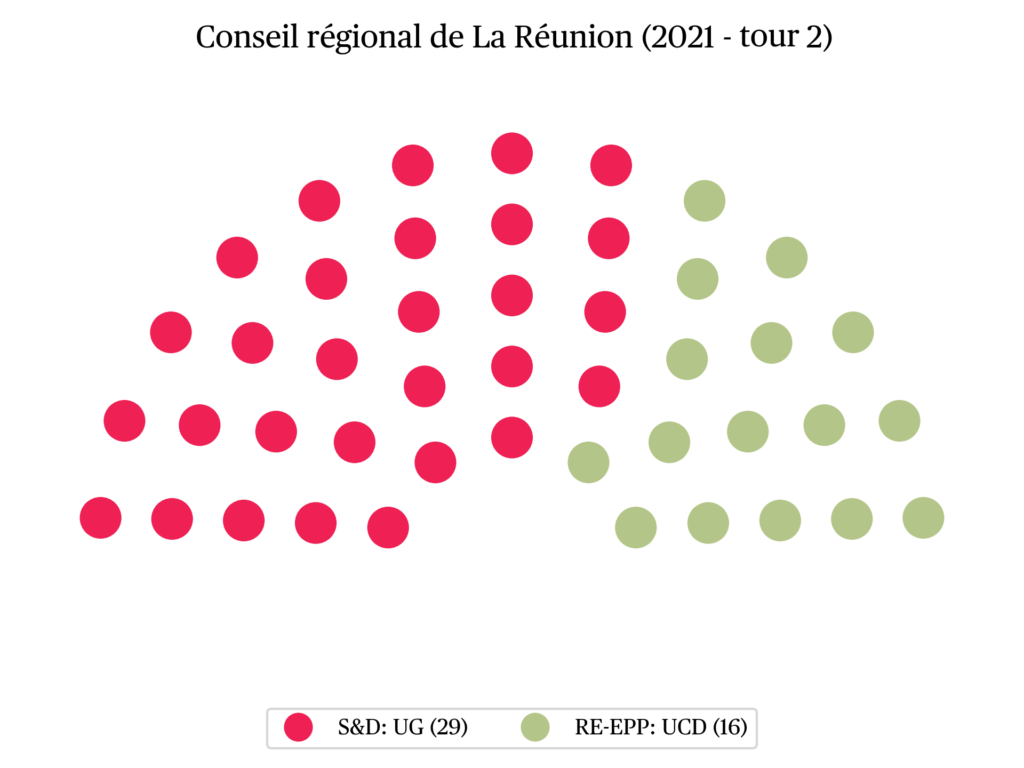Regional election in Réunion, 20-27 June 2021
Christiane Rafidinarivo
Visiting researcher in political science at CEVIPOF (Sciences Po Paris)Issue
Issue #2Auteurs
Christiane Rafidinarivo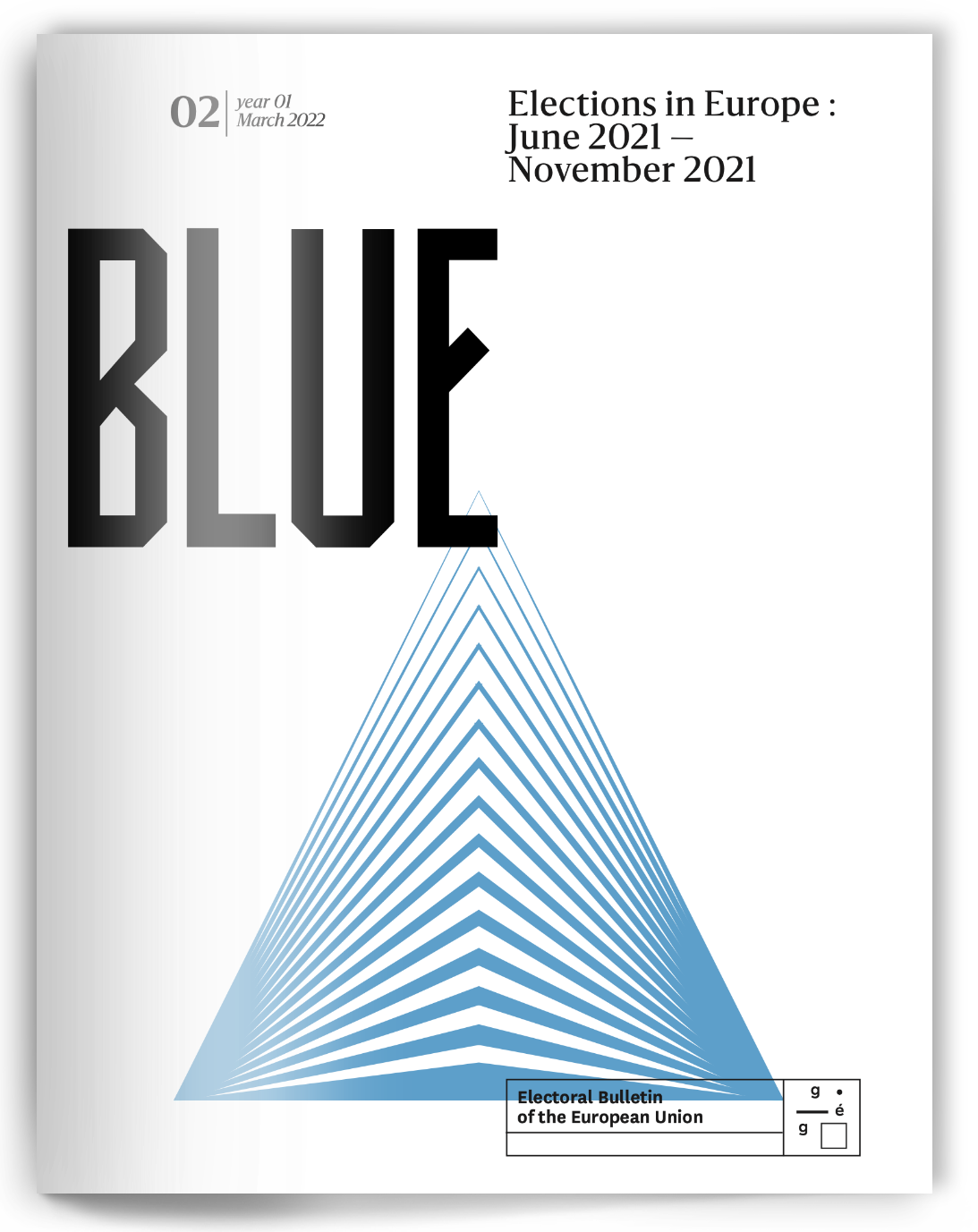
21x29,7cm - 167 pages Issue 2, March 2021 24,00€
Elections in Europe : June 2021 – November 2021
Réunion, located in the Indian Ocean, is a French Overseas Department and Region (DROM), as well an Ultra Peripheral Region (UPR) of the European Union. As the regional council of Réunion is in charge of allocating local, national and European funding to regional projects, regional elections are closely followed by the island’s electorate. The Region is also commonly viewed as responsible for protecting the purchasing power of the Réunionese and the local economy. It is the main actor of territorial development, owing to its key role in building and managing infrastructure such as roads, hospitals and high schools. As an outermost region of the EU, Réunion benefits from the European Regional Development Fund (ERDF), the European Social Fund (ESF), as well as INTERREG funding in the context of regional cooperation. The Common Agricultural Policy (CAP) is also of paramount importance, as it provides essential financial support to the sugarcane industry, the largest employer in Réunion. Most of the political parties in Réunion are therefore pro-European, with controversies mainly revolving around the allocation of funds. Party competition is organized along a left-right cleavage, and characterized by idiosyncratic interactions between national and regional electoral dynamics.
Following the Yellow Vests movement of 2018, strong democratic demands have emerged in the region — in terms of the evaluation of regional policies, transparency or citizen participation — that have been intensely discussed during the 2021 campaign. The differentiation of the political offer in response to these demands gave political meaning to the electoral competition, boosting electoral mobilization especially of the second round. What does this mobilization reveal about the interaction between local and national political dynamics?
The key role of mobilization between the two rounds of voting
Huguette Bello, the leader of the “United Left” list and a former member of the Communist Party of Réunion (PCR), was elected president of the Regional Council following the 2021 regional elections. Bello’s list won the second round of voting with 51.85% of the vote; Didier Robert’s center-right coalition, who had been in the lead in the first round, obtained only 48.15% (Figure a). Robert had been leading the Regional Council for two consecutive terms since its victory in the 2010 election, when — while he was still a member of the National Assembly for Réunion — he defeated PCR incumbent Paul Vergès. Bello succeded in reversing the trend in the second round of voting through stronger mobilization of her electorate.
Abstention was 63.40% in the first round and 53.50% in the second. This decrease of 10 percentage points reflects a significant re-mobilization of the electorate between the two rounds. Martial Foucault1 has hypothesized that such re-mobilizations could be triggered by “election closeness”: the closer the result in the first round, the higher the participation in the second. In the specific regional context of Réunion, however, an alternative analysis can be suggested, which relates higher turnout to higher stakes in the second round of voting. The rate of voter turnout in the second round of the 2021 regional election is close to the one observed in the 2019 municipal election.
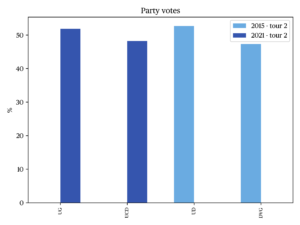
A close and uncertain contest
The 2021 campaign was a close contest with an uncertain outcome. Center-right incumbent Didier Robert could rely on three key assets that helped him win the first round. First, Robert succeeded in uniting center-right parties — most importantly the right-wing Républicains (LR) and the center-right Union of Democrats and Independents (UDI) — around him, after years of divisions caused by internal rivalries and the national political recomposition taking place since 2017. Robert had built up popular support in Saint-Denis, which had become apparent in 2019 when he ran for the municipal elections in the stronghold of Ericka Bareigts (Socialist Party), a former Minister for Overseas France. During the campaign, Robert emphasized the achievements of his two terms of office while arguing against Bello’s flagship “tram train” project, which the Communists had put forward as a solution to mobility issues, and portraying her as a far-left extremist. On the other hand, Robert was weakened by the non-completion of his flagship infrastructure project, the New Coastal Road (Nouvelle Route du Littoral), which lacked a realistic future timeline; he had also been convicted for receiving undue remuneration from a regional public museum, a decision he had appealed.
1
finally, his electorate was deemed volatile. In the end, Robert did not gather sufficient support to win the second round.
Huguette Bello’s list obtained the most votes of all left-leaning lists in the first round, and subsequently succeeded in uniting the left around her candidacy. Bello has served as an opposition Regional Councillior since 2010. She gave up her mandate as a member of the National Assembly in 2020 — a role in which she had earned recognition well beyond her own party —, to devote herself fully to Réunionese politics. In 2019, she regained Saint-Paul, the largest municipality on the Island. Since the left the PCR in 2014, Bello has been backed by the micro-party she helped create. However, in order for her to win the regional presidency in 2021, an alliance with like-minded patries was indispensable. Between the two rounds of voting, her list therefore merged with those led by Ericka Bareigts (PS mayor of Saint-Denis, allied with the PCR) and Patrick Lebreton (mayor of Saint-Joseph). She also benefitted from external support by Olivier Hoareau (ecologist mayor of Le Port) and the Unbowed France list; the division of the left was thus effectively overcome. In the second round, Huguette Bello’s list eventually obtained a majority of 29 seats out of 45 in the Regional Council.
Still, the “Union of the Left” was not complete. Vanessa Miranville (the ecologist mayor of La Possession), who ran for the first time in a regional election, did not give any voting advice between the two rounds. She put emphasis on the specificities of her own approach, which she described as “civic”, as well as her electorate. With 9.91% of the vote in the first round, Miranville attempted to position herself as a kingmaker.
A vote structured by a dynamic left-right cleavage
Since its creation in 1986, the French regional institutional framework has been well accepted by Réunion’s political parties. There is no significant independence movement in Réunion. While, historically, it was mostly the PCR that called for further regional autonomy, autonomism has no longer been a core issue in Réunionese politics since the end of Paul Vergès’s presidency (1998-2010). Meanwhile, the PCR has become a party of regional governance. The left-right divide in Réunion is structured by the opposition between a “social” and a “liberal” school of thought which favor distinct approaches to governance. Schematically, “socialists” tend to seek closeness to the government in order to achieve their objectives, while “liberals” assert themselves more strongly vis-à-vis the state and want it to exert specific competencies. Both the right and the left are historically divided in Réunion, a trend that was further exacerbated by the recomposition of the French party landscape in the aftermath of the 2017 presidential election, leading to the emergence of a number of micro-parties. Since then, Réunionese parties have had to dedicate considerable effort to (re)shaping viable electoral alliances.
The left-right divide revealed by the results of the 2021 regional election is strongly territorialized. Sectoral issues are also important, and the capacity of civil society (e.g. user associations) to mobilize the electorate has proved to be significant, especially on issues such as construction, transport or the environment. The left won in the most populous municipalities of the island’s coastline, with a strong breakthrough in Saint-Pierre, once a stronghold of the right-wing Republicans; these are the areas that concentrate economic activity, and also the most impacted by mobility issues (Rafidinarivo 2020); however, als Bello herself underlines, the left was also strong in more rural parts of the coastline. On the other side, (center-)right parties won Saint-Denis, a former PS bastion. Didier Robert’s campaign strategy in the Saint-Denis municipal election seems to have born fruit at the regional level as well. Although its effect was too localized to prevent the loss of the center-right majority in the Regional Council, Robert’s campaign has successfully undermined the left’s “bastion-building” strategy. Robert’s score in the second round also confirms the existence of a strong electoral base on which his political family — and possibly himself — will be able to rely in the national (i.e. presidential and legislative) elections of 2022.
Regional dynamics
Since 2017, Réunionese electorates have been reshuffled. Two categories of elections stand out: elections with a national scope and local elections. In the first round of the presidential election, Jean-Luc Mélenchon (Unbowed France) led with 24.53% of the vote, a score boosted by his popularity among young voters. In the second round, the Réunionese voted overwhelmingly for Emmanuel Macron (En Marche!) with 60.25%. In the 2019 European elections, the “Take Power” list supported by Marine Le Pen (Rassemblement National) dominated in all the municipalities of the island with 31.24% of the vote island-wide. Since then, however, none of Mélenchon’s, Macron’s and Le Pen’s party has been able to establish a strong local presence in Réunion. The dynamics observed among the electorate do not, therefore, necessarily reflect those of the local party establishment. Moreover, political equilibria are strongly affected by differential mobilization of the various electorates. Insufficient mobilization negatively affected the far right in the presidential election, but had a positive impact on their score in the 2019 European elections, when 69.31% of the electorate abstained.
Was this a consequence of the strong mobilization of the Yellow Vests in Reunion in 2018? The movement had been very critical of elected officials of all policial parties, and particularly of the regional political establishment. But the impact of these movements on Réunionese electoral behavior in the following European election is difficult to establish. In the 2017 election, the National Front had already achieved a breakthrough in Overseas France, ranking first in these territories (Rafidinarivo 2017). Can this be linked to the trend, now observed for several terms, of a shift of part of the left vote towards the National Front (Perrineau 2017)? Answering this question would require a more thorough analysis of the Réunionese vote.
In the 2020 municipal election, local leaders fought for they own political survival by building on proximity, micro-parties and local funding. Didier Robert, the outgoing regional president, was elected municipal councillor in Saint-Denis thanks to his social agenda rather than his defense of mega-projects. The left achieved a breakthrough, and Huguette Bello was re-elected mayor of Saint-Paul. The results of the subsequent elections of inter-municipal bodies provided important signals to analyze the balance of power and the potential compatibility between the various political platforms, especially on issues such as land use planning and social justice. But rivalries remain strong in each political family. In the 2021 regional election, coalitions were needed to win: the “Union of the Centre and the Right” ran as a single list in the first round, while the list of the “Union of the Left” was constituted between the two rounds of voting — and eventually won.
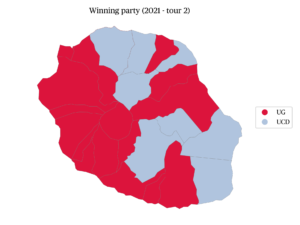
Consequences at the national level
“This victory undoubtedly has a national impact,” said Huguette Bello in her victory speech on election day. While Bello did not consider running for President of France as did Île-de-France incumbent Valérie Pécresse and Hauts-de-France President Xavier Bertrand, she valued the outcome of the election as a strong sign that a united left is capable to win, even when a common platform emerges only late in time. The Réunionese vote, Bello said, shows that when parties are willing to implement an alliance (by merging their lists or building a coalition) in the second round, victory is possible. In fact, (center-)right parties have done exactly this in Réunion in 2021 — and lost. The losing strategy of the right in the first round was transformed in a winning one by the left in the second. In the end, it was not so much the capacities of candidates to achieve consensus around them which decided the outcome, but rather the mobilization of their respective electorates.
The President of the Réunion Region, Huguette Bello, supports Jean-Luc Mélenchon’s candidacy in the 2022 presidential election. She describes this support as an alliance between progressives based on shared preferences and values, as she argued at length at a public gathering of Unbowed France1. The President of the Département of Réunion, Cyrille Melchior (Les Républicains), who was re-elected in the 2021 Departmental elections, has announced that he would endorse Emmanuel Macron’s candidacy despite his having supported Valerie Pécresse during the nomination process of LR’s presidential candidate. He justifies his support for Emmanuel Macron by his “appreciation” of the central government’s decision to take over the payment of unemployment benefits since 2021. This recentralization, he argued, had created significant financial leeway for the Département The presidential election is used by local political actors, opinion leaders and, in this case, by local authorities, to affect the local balance of power. At the national level, the current electoral recomposition is characterized by a division of the far-right electorate between Marine Le Pen and Eric Zemmour. As the official list of candidates is being finalized, left-wing candidates have not united behind a single candidate. The competition seems to be very tight to reach the second round except for Emmanuel Macron, who announced his candidacy in a “Letter to the French”, on March 3 online and on March 4 in the French regional press. Since the beginning of the war in Ukraine, all polls have been predicting that he would be the winner of the April 2022 presidential election. France holds the Presidency of the European Union until June 2022.
Literature
Foucault, M. (2021, July). Evolution du vote régional outre-mer 2015-2021. FOROM n°1.
Perrineau, P. (2017). Cette France de gauche qui vote FN. Paris: Seuil.
Rafidinarivo, C. (2017, June). Dynamique de la recomposition politique : la fin du bipartisme d’alternance. Analyse comparée des votes Outremers et France entière de la présidentielle 2017. Note ENEF 41 (Enquête Electorale Française), Sciences Po CEVIPOF.
Rafidinarivo, C. (2020, April). Note de recherche Forum Vies Mobiles La Réunion, Paris: Forum Vies Mobiles.
Notes
citer l'article
Christiane Rafidinarivo, Regional election in Réunion, 20-27 June 2021, Mar 2022, 82-86.
à lire dans cette issue
voir toute la revue






